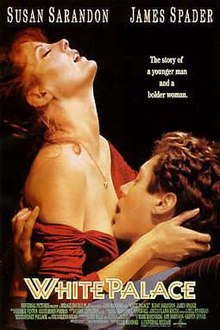
James Todd Spader is an American actor. He is known for often portraying eccentric and morally ambiguous characters. He started his career in critically acclaimed independent films before transitioning into television for which he received numerous awards and acclaim including three Primetime Emmy Awards as well as nominations for three Golden Globe Awards, and ten Screen Actors Guild Awards.

Stanley Kowalski is a fictional character in Tennessee Williams' play A Streetcar Named Desire.

Chandler Muriel Bing is a fictional character from the NBC sitcom Friends, portrayed by Matthew Perry. Chandler was born to Nora Tyler Bing, an erotic romance novelist, and Charles Bing, a gay female impersonator and star of a Las Vegas drag show called "Viva Las Gay-gas" as Helena Handbasket. Chandler is of Scottish and Swedish descent. He is an only child and is apparently from an affluent family. His parents announced their divorce to him over Thanksgiving dinner when Chandler was nine years old, an event which gave him trauma and now he refuses to celebrate the holiday in his adulthood and led him to develop his notorious sense of humor as a defense mechanism. It is revealed in season 2 that he went to an all-boys high school.
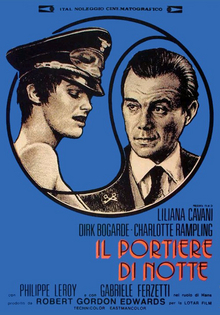
The Night Porter is a 1974 English-language Italian erotic psychological war drama film. Directed and co-written by Liliana Cavani, the film stars Dirk Bogarde and Charlotte Rampling, with Philippe Leroy, Gabriele Ferzetti, and Isa Miranda in supporting roles. Set in Vienna in 1957, the film centers on the sadomasochistic relationship between a former Nazi concentration camp officer (Bogarde) and one of his inmates (Rampling).

Husbands and Wives is a 1992 American comedy-drama film written and directed by Woody Allen. The film stars Allen, Mia Farrow, Sydney Pollack, Judy Davis, Lysette Anthony, Juliette Lewis, Liam Neeson and Blythe Danner. The film debuted shortly after the end of Allen and Farrow's romantic and professional partnership, and was the last of their 13 films together. The movie is filmed by Carlo Di Palma with a handheld camera style and features documentary-like interviews with the characters interspersed with the story.

What Price Hollywood? is a 1932 American pre-Code drama film directed by George Cukor and starring Constance Bennett with Lowell Sherman. The screenplay by Gene Fowler, Rowland Brown, Jane Murfin and Ben Markson is based on a story by Adela Rogers St. Johns and Louis Stevens. The supporting cast features Neil Hamilton, Gregory Ratoff, Brooks Benedict, Louise Beavers and Eddie "Rochester" Anderson.
Phileine Says Sorry is a Dutch/American 2003 comedy-drama film directed by Robert Jan Westdijk. It is based on the novel Phileine zegt sorry by Ronald Giphart.
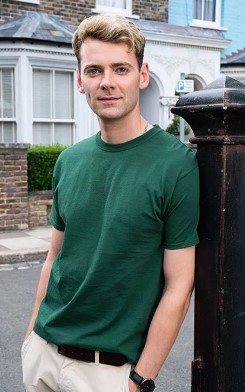
Peter Beale is a fictional character from the BBC soap opera EastEnders and he is played by Thomas Law. Peter makes his first appearance in episode 926, originally broadcast on 16 December 1993. Peter has been played by seven actors since being introduced in 1993. Francis Brittin-Snell portrayed the role from 1993 to 1996, followed by Alex Stevens from 1997 to 1998 and Joseph Shade from 1998 to 2004. James Martin took over and played the role from 2004 to 2006. He was played by Thomas Law from 2006 until 2010, when the character departed the series. In April 2013, it was announced that Peter would return, played by Ben Hardy who made his first appearance on 7 June 2013. Hardy announced his departure from the role in November 2014, making his final on-screen appearance on 24 February 2015.

Bobby Beale is a fictional character from the BBC soap opera EastEnders, who made his first appearance in episode 2557, originally broadcast on 24 July 2003. The character was originally played by Kevin Curran as an infant. Prior to his introduction, Bobby's paternity is at the centre of a storyline and is resolved when Ian Beale is revealed as Bobby's father. His mother, Laura Beale, is killed off in 2004 and Bobby's stepmother, Jane Beale, later adopts Bobby. Curran was replaced by Alex Francis in 2007. Following Jane's departure, Bobby finds a mother figure in Mandy Salter and is upset when she leaves.

The Beales and the Fowlers are a fictional family in the BBC soap opera EastEnders. They were the main family for storylines in early episodes of EastEnders, and remained as such ever since. With at least one member of the family having been a member of the cast from the first episode in February 1985, they are the show's longest serving family. The original Beale/Fowler family consisted of matriarch Lou Beale and her children Pete and Pauline, alongside their families including their children Ian, Mark, Michelle and their spouses Kathy Hills and Arthur Fowler. Additionally, several members of the family have been introduced at a later point, including Pauline and Arthur's son Martin who was the first baby to be born into the show in 1985. The family has been headed with a matriarch first seen with Lou, and over the years, Lou's daughter Pauline, Ian's wife Jane Collins and more recently Pete's wife Kathy, have filled this role.
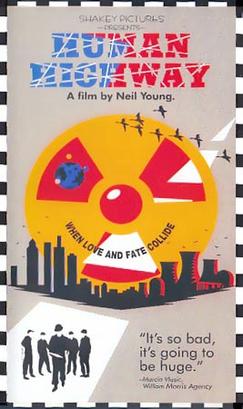
Human Highway is a 1982 American comedy film starring and co-directed by Neil Young under his pseudonym Bernard Shakey. Dean Stockwell co-directed the film and acted along with Russ Tamblyn, Dennis Hopper, and the band Devo. Included is a collaborative performance of "Hey Hey, My My " by Devo and Young with Booji Boy singing lead vocals and Young playing lead guitar.
"The One with All the Thanksgivings" is the eighth episode of the fifth season of Friends. It first aired on the NBC network in the United States on November 19, 1998. In the episode, the main characters spend Thanksgiving at Monica's apartment and begin telling stories about their worst Thanksgivings: Chandler learning of his parents' divorce, Phoebe losing arms in past lives and Joey having his head stuck in a turkey. Rachel reveals Monica's worst Thanksgiving—accidentally cutting off Chandler's toe after he called her "fat" in their first encounter. When Monica begs Chandler to forgive her, he accidentally reveals that he loves her.
"In or Out" is an episode from the dramedy series Ugly Betty, the thirteenth in the series overall, which aired on January 18, 2007. It was written by Myra Jo Martino and directed by Michael Spiller. The episode title itself is an allusion to the film with the similar name.

Empire Falls is a 2001 novel written by Richard Russo. It won the Pulitzer Prize for Fiction in 2002, and follows the story of Miles Roby in a fictional, small blue-collar town in Maine and the people, places, and the past surrounding him, as manager of the Empire Grill diner.
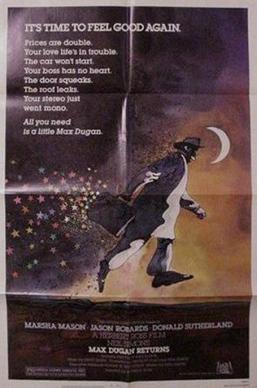
Max Dugan Returns is a 1983 American comedy-drama film written by Neil Simon and directed by Herbert Ross. Starring Jason Robards in the title role along with Marsha Mason and Donald Sutherland, it marks the film debuts of both Sutherland's son Kiefer and Matthew Broderick, and is both the last of five Simon-Ross collaborations and the last of Simon's films starring Mason.
Neil Steere McCarthy was an American corporate and film industry lawyer, and a Thoroughbred racehorse owner-breeder.

Marry Me! is a 1949 British comedy film directed by Terence Fisher, and starring Derek Bond, Susan Shaw, Patrick Holt, Carol Marsh and David Tomlinson.

The Death & Life of John F. Donovan is a 2018 Canadian drama film co-written, co-produced, and directed by Xavier Dolan, in his English-language debut. The film stars Kit Harington, Jacob Tremblay, Natalie Portman, Susan Sarandon, Kathy Bates, Thandiwe Newton, Ben Schnetzer, and Jared Keeso. It deals with themes of celebrity, tabloid media in Hollywood, mother-son relationships, and homosexuality.

The Sandman is an American fantasy drama television series based on the 1989–1996 comic book written by Neil Gaiman and published by DC Comics. The series was developed by Gaiman, David S. Goyer, and Allan Heinberg for the streaming service Netflix and is produced by DC Entertainment and Warner Bros. Television. Like the comic, The Sandman tells the story of Dream / Morpheus, the titular Sandman. The series stars Tom Sturridge as the title character, with Boyd Holbrook, Vivienne Acheampong, and Patton Oswalt in supporting roles.
Glenn Savan was an American writer best known for White Palace, his 1987 debut novel. A film adaptation, starring Susan Sarandon and James Spader, was released in 1990.
